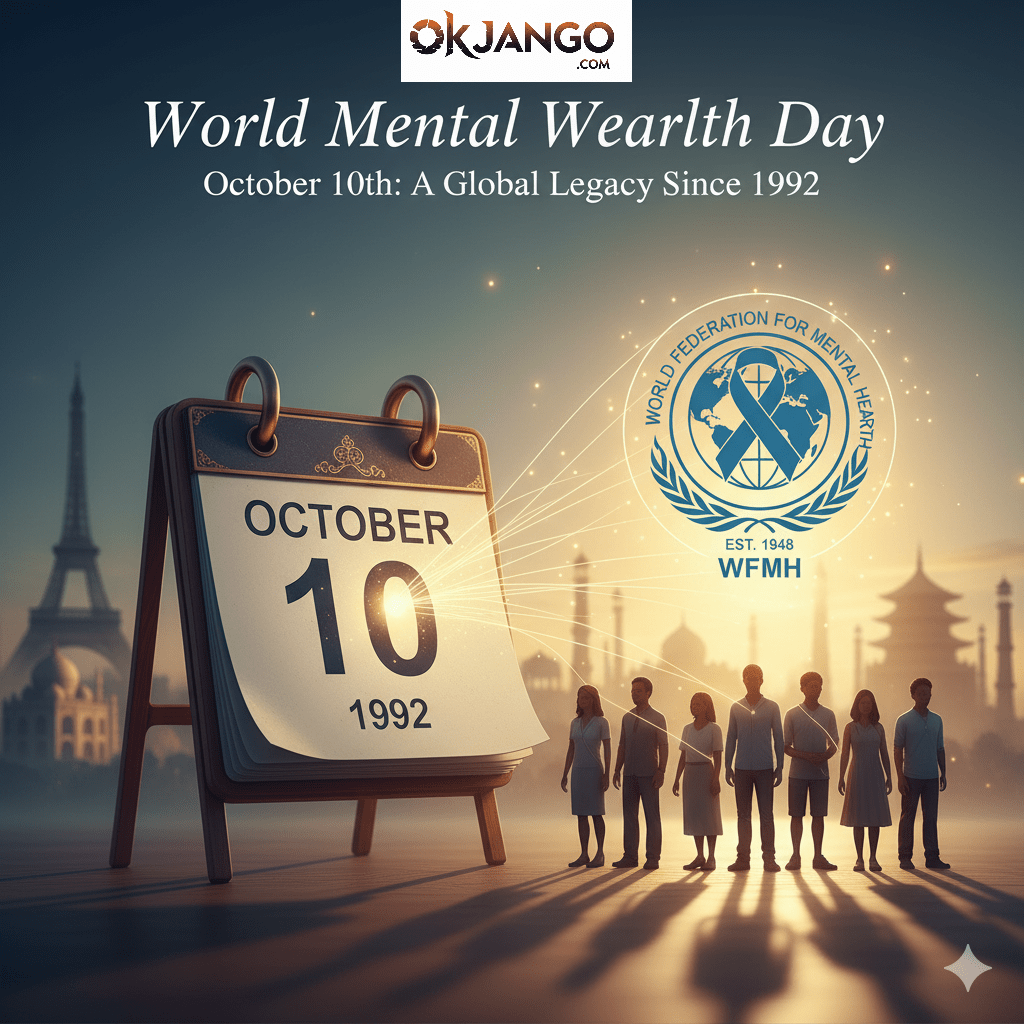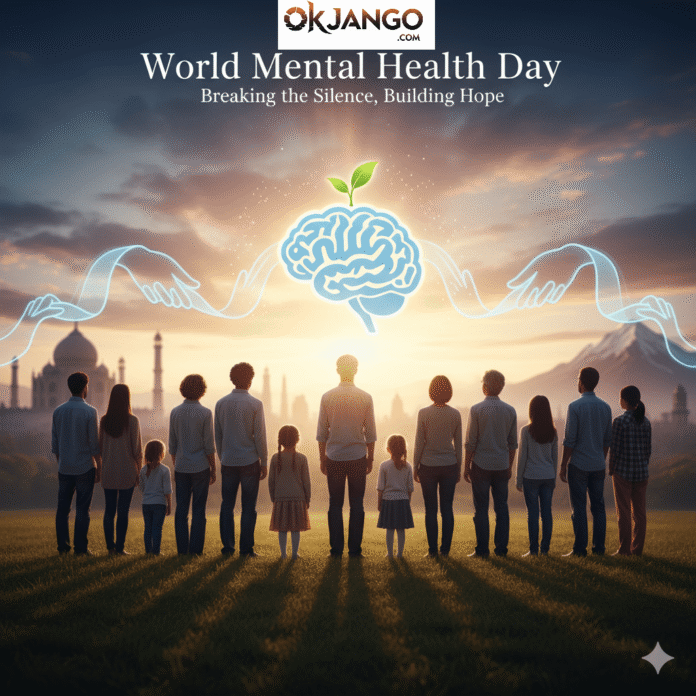Have you ever felt stressed, anxious, or just not quite yourself? Just like our bodies can get sick, our minds need care and attention too. This is what mental health is all about—it includes our emotional, psychological, and social well-being.
What is World Mental Health Day (WMHD)? A Global Guide
World Mental Health Day is an international day for global mental health education, awareness, and advocacy against social stigma.
Each year, it centers around a specific theme, set by the World Federation for Mental Health (WFMH), to highlight particular aspects of mental health that require global attention.
Past themes have focused on topics like “Mental Health in an Unequal World,” “Mental Health for All,” and “Young People and Mental Health in a Changing World.”
World Mental Health Day, celebrated every year on October 10th, is a global reminder that mental health is a fundamental human right.
It’s an important day to:
- Stop the Stigma: Encourage open talk so people feel safe asking for help.
- Raise Awareness: Teach people how to protect their own mental health and support others.
- Mobilizing Support: Advocating for better mental healthcare services, policies, and resources worldwide.
- Push for Change: Ask governments and communities to provide better support and services for everyone, everywhere.
This day is a chance to shine a light on the challenges many people face and inspire action toward a more understanding and supportive world.
Why is WMHD on October 10th? The History of the Day
World Mental Health Day is celebrated every year on October 10th. This date was established in 1992 by the World Federation for Mental Health (WFMH), an international non-governmental organization founded in 1948.
The initial goal was not to attract a specific date but to hold an annual activity to promote advocacy in the mental health field. The WFMH’s Deputy Secretary-General at the time, Richard Hunter, suggested an annual ‘World Mental Health Day.’ It began as just a day of general awareness, without a specific theme, but quickly evolved into the focused, theme-driven event we know today, largely thanks to Dr. Eugene Brody’s leadership as Secretary-General, who initiated the annual themes in 1994.
How is World Mental Health Day Celebrated?
Across the globe, a wide array of activities take place to mark World Mental Health Day:
| Activity Type | Description | Goal & Impact |
| Educational Campaigns | Organizations, schools, and workplaces host workshops, seminars, and distribute materials on conditions, coping strategies, and support services. | Increase Knowledge: Ensures people understand mental health, its protection, and available help. |
| Advocacy & Policy Discussions | Governments and NGOs meet to discuss current policies, advocate for increased funding, and push for legislative changes. | Drive Change: Influences policy to improve access to quality mental healthcare and protect the rights of individuals. |
| Public Events | Community gatherings like walks, runs, concerts, and art exhibitions are organized globally. | Foster Solidarity: Reduces isolation, builds supportive networks, and normalizes open dialogue about mental health. |
| Media Outreach | News outlets, social media platforms, and public figures amplify messages, sharing expert advice, personal stories, and resources. | Amplify Awareness: Brings mental health into the global spotlight, reaching millions and challenging stigma. |
| Online Engagement | Hashtags like #WorldMentalHealthDay trend globally, encouraging millions to share experiences and access information. | Global Connection: Provides a digital space for people to connect, share, and access resources instantly. |
| Therapeutic Activities | Wellness centers and providers often offer free or discounted sessions, mindfulness workshops, and self-care resources. | Promote Well-being: Encourages individuals to actively engage in self-care and resilience-building practices. |
The Real Impact: How World Mental Health Day Reduces Stigma
World Mental Health Day has a profound and far-reaching impact:
| Area of Impact | How WMHD Drives Change | Resulting Benefit |
| Stigma Reduction | By bringing mental health into the global spotlight, it normalizes conversations and challenges discrimination. | People feel less alone; public figures sharing struggles encourages peers to open up. |
| Awareness & Understanding | Educates individuals on the signs, symptoms, and nature of mental health conditions. | Leads to earlier recognition, greater empathy for those affected, and timely intervention. |
| Help-Seeking Behavior | Reduced stigma and enhanced awareness lead more people to acknowledge their needs and reach out for professional support. | Improves individual outcomes and recovery rates across the population. |
| Policy & System Change | Provides a powerful platform for advocates to pressure governments for better resources, funding, and rights protections. | Improves access to quality mental healthcare and integrates mental health into primary care. |
| Community & Support | Creates opportunities for connection, shared experiences, and building strong, supportive networks. | Combats feelings of isolation and loneliness, fostering collective well-being. |
| Individual Empowerment | Provides people with the knowledge and resources necessary to prioritize self-care and resilience. | Enables individuals to take charge of their mental well-being and proactively manage stress. |
In essence, World Mental Health Day is not just a single day of observance; it’s a powerful catalyst for a year-round movement towards better mental health for everyone, everywhere.
The Top 10 Countries Prioritizing Mental Health
Mental health rankings can vary based on criteria (prevalence, system quality, spending, etc.), but countries in Northern Europe consistently rank highly for quality of care, access, and proactive policies.
Here is a list of the Top 10 Countries Prioritizing Mental Health based on recent comprehensive rankings that combine quality of care, government spending, and positive outcomes. These nations consistently rank highest due to their combination of universal access, strong government funding, and proactive strategies to combat stigma and promote well-being.
| Rank | Country | Noted Key Strength |
| 1 | Sweden | Universal, zero-cost care; high spending; pioneering 24/7 telepsychiatry services. |
| 2 | Luxembourg | Exceptionally high percentage of total government health spending dedicated to mental healthcare. |
| 3 | Norway | Strong emphasis on prevention, early intervention, and comprehensive welfare state integration. |
| 4 | Netherlands | Excellent health system quality, focus on early intervention, and community-based care. |
| 5 | Latvia | Ranked highly for overall positive mental well-being and life satisfaction scores in recent surveys. |
| 6 | Germany | Universal healthcare access; strong integration of mental health into primary care; high professional-to-patient ratios. |
| 7 | Finland | Consistently ranked the happiest country; strong emphasis on school-based counseling and proactive community services. |
| 8 | Denmark | Focus on prevention, with public “mental health cafés” and annual depression screening initiatives. |
| 9 | Canada | State-funded treatment and a solid network of community programs; ongoing strategy to address youth mental health. |
| 10 | Australia | Mature Medicare-funded system and dedicated focus on lowering stigma and improving physical health outcomes for people with mental illness. |
Resources for WMHD: Where to Find Mental Health Support
- World Federation for Mental Health (WFMH): https://wfmh.global/world-mental-health-day/
- World Health Organization (WHO) – Mental Health: https://www.who.int/health-topics/mental-health
- Mental Health America (MHA): https://www.mhanational.org/
- National Alliance on Mental Illness (NAMI) – USA: https://www.nami.org/
- Mind (UK Mental Health Charity): https://www.mind.org.uk/
Frequently Asked Questions (FAQs)
What is World Mental Health Day?
World Mental Health Day is an international event observed annually on October 10th. It aims to raise global awareness about mental health issues, advocate against social stigma, and mobilize efforts to support mental well-being worldwide.
When is World Mental Health Day celebrated?
World Mental Health Day is celebrated every year on October 10th.
What is the theme for World Mental Health Day?
The theme for World Mental Health Day changes annually. You can find the most current theme on the official World Federation for Mental Health (WFMH) website or the World Health Organization (WHO) website.
Why is mental health important to discuss?
Discussing mental health is crucial because it helps reduce stigma, encourages people to seek help, promotes understanding of mental health conditions, and advocates for better mental healthcare access and policies. Good mental health is just as vital as physical health for overall well-being.
How can I participate in World Mental Health Day?
You can participate by educating yourself and others, sharing information on social media using relevant hashtags (e.g., #WorldMentalHealthDay), supporting mental health organizations, attending local events, or simply starting a conversation about mental well-being with friends and family.
Where can I find support for my mental health?
If you or someone you know needs support, reach out to mental health professionals, local mental health organizations, crisis hotlines, or your primary care doctor. Websites like WHO, NAMI, Mind, and MHA also offer valuable resources and directories for help.
Who founded World Mental Health Day?
World Mental Health Day was established by the World Federation for Mental Health (WFMH) in 1992.
Read more blogs at : Okjango.com
Disclaimer : https://okjango.com/disclaimer/


